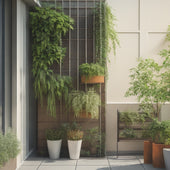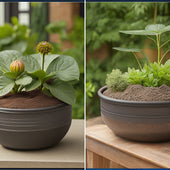
What Are the Health Benefits of Rooftop Gardening?
Share
By cultivating a rooftop garden, you're not only growing plants, but also nurturing your overall well-being. This unique activity offers a multitude of surprising health benefits that can positively impact your mental and physical health. You'll reduce stress and anxiety through mindful gardening, improve your mental health outcomes with a sense of purpose and responsibility, and boost your vitamin D levels naturally through sunlight exposure. Plus, you'll increase your physical activity levels, breathe in fresh air, and strengthen your lungs. As you start digging, you'll uncover even more ways rooftop gardening can transform your health and happiness.
Key Takeaways
• Rooftop gardening reduces stress and anxiety by providing calming surroundings and promoting mindful physical activity.
• It improves mental health outcomes by fostering a sense of purpose, increasing self-esteem, and releasing endorphins.
• Rooftop gardens offer a natural way to boost vitamin D levels through sunlight exposure, supporting strong bones and immune function.
• Gardening activities increase physical activity levels, providing cardiovascular benefits, improving flexibility, and strengthening lungs.
• Rooftop gardening exposes individuals to fresh air, reducing pollutants and allergens, and contributing to improved respiratory health.
Reduces Stress and Anxiety
As you step onto your rooftop garden, the calming surroundings and gentle rustle of leaves work together to quiet your mind and reduce feelings of stress and anxiety.
This is where mindful gardening comes in - a therapeutic approach that combines physical activity with mental relaxation. By immersing yourself in nature, you'll start to let go of tension and worries, replacing them with a sense of calm and serenity.
Nature therapy, a concept rooted in the idea that spending time in nature has healing properties, is a key component of rooftop gardening. As you tend to your plants, you'll become more present in the moment, focusing on the sights, sounds, and smells around you.
This mindfulness helps to distract from racing thoughts and emotions, allowing you to unwind and recharge. By incorporating mindful gardening into your rooftop garden routine, you'll be taking a proactive step towards reducing stress and anxiety, and cultivating a deeper connection with yourself and the natural world.
Improves Mental Health Outcomes
By cultivating a rooftop garden, you're not only reducing stress and anxiety but also taking a significant step towards improving your overall mental health outcomes.
As you nurture your plants, you're cultivating a sense of purpose and responsibility, which can have a profound impact on your self-esteem and confidence. This, in turn, can lead to improved cognitive function, as your mind becomes sharper and more focused.
Additionally, the physical activity involved in gardening can stimulate the release of endorphins, also known as 'feel-good' hormones, which can help alleviate symptoms of depression.
As you connect with nature, you're building emotional resilience, allowing you to better cope with life's challenges. The sense of accomplishment that comes with watching your plants thrive can be incredibly empowering, helping you develop a more optimistic outlook on life.
Boosts Vitamin D Levels Naturally
Your rooftop garden is an ideal spot to soak up some sunshine, and with it, a natural boost of vitamin D, essential for strong bones, immune function, and even mood regulation.
By spending time in your rooftop garden, you're increasing your sun exposure, which triggers vitamin synthesis in your skin. This natural process helps your body produce the vitamin D it needs to function properly.
As you tend to your plants, you're not only nurturing their growth but also yours. Vitamin D deficiency is a common issue, especially during winter months or for those who spend most of their time indoors.
By incorporating rooftop gardening into your routine, you're taking a proactive step towards maintaining healthy vitamin D levels. So, take a few minutes each day to bask in the sun's warm rays, and let your body do the rest.
You'll be enjoying the physical and emotional benefits of rooftop gardening in no time!
Increases Physical Activity Levels
Rooftop gardening requires you to get moving, whether it's hauling pots, digging, or simply walking around your plot. This adds up to a significant amount of physical activity that can make a real difference in your overall health.
You'll be surprised at how much of a cardio workout you can get from gardening! All that bending, lifting, and stretching can get your heart rate up and burn those calories.
Plus, as you learn new gardening techniques, you'll find yourself engaging in physical activity without even realizing it. You might start with simple tasks like watering and pruning, but soon you'll be tackling more physically demanding tasks like building planters or installing irrigation systems.
As you work on your rooftop garden, you'll notice improvements in your flexibility, balance, and overall physical fitness.
And the best part? You'll be having so much fun that you won't even feel like you're exercising! So, get ready to get moving and reap the physical benefits of rooftop gardening.
Fresh Air and Cleaner Lungs
As you're digging and planting, you're not just getting a workout - you're also breathing in fresh air and filling your lungs with oxygen, a welcome change from the stale, recycled air you're often stuck with indoors.
Rooftop gardening provides an opportunity to escape the confines of your home or office and connect with nature, which has a significant impact on your respiratory health.
By spending time outdoors, you can:
** Improve air quality by reducing your exposure to pollutants and allergens.
** Increase oxygen intake, which can help to reduce stress and anxiety.
** Strengthen your lungs and improve respiratory function.
** Reduce the risk of respiratory problems, such as asthma and bronchitis, by breathing in fresh, clean air.
Rooftop gardening offers a unique opportunity to prioritize your health and wellbeing, and it starts with the air you breathe.
Frequently Asked Questions
Can Rooftop Gardens Be Grown in Small Spaces or Apartments?
You can definitely grow a rooftop garden in small spaces or apartments! Consider vertical gardening or container gardening to maximize space. With a little creativity, you'll be enjoying fresh air and greenery in no time!
Are Rooftop Gardens Susceptible to Pests and Diseases?
"As you tend to your rooftop haven, be prepared to tackle pesky pests and diseases. You'll need to prioritize pest management and disease prevention strategies to keep your garden thriving, but don't worry, it's a manageable challenge!"
Do Rooftop Gardens Require Special Permits or Licenses?
You'll likely need to navigate a permit application process, which involves researching and complying with local zoning regulations, to guarantee your rooftop garden meets all necessary requirements and avoids potential legal issues.
Can Rooftop Gardens Be Designed for Wheelchair Accessibility?
You can definitely create a wheelchair-accessible rooftop garden by incorporating ramps, wide pathways, and adaptable garden design elements, ensuring everyone can enjoy the therapeutic benefits of gardening, regardless of mobility limitations.
Are Rooftop Gardens More Prone to Weather Damage?
You're probably thinking rooftop gardens are a recipe for disaster, but surprisingly, they can be designed with weather resilience in mind. Consider structural reinforcements and clever waterproofing to guarantee your haven withstands the elements.
Related Posts
-

3 Best Space-Saving Gardening Ideas for Urban Renters
You can turn even the smallest urban space into a lush oasis by utilizing clever space-saving gardening ideas. Maximi...
-

3 Best Space-Saving Gardening Ideas for Urban Renters
You can turn even the smallest urban space into a lush oasis by utilizing clever space-saving gardening ideas. Maximi...
-

3 Best Space-Saving Gardening Ideas for Urban Renters
You can turn even the smallest urban space into a lush oasis by utilizing clever space-saving gardening ideas. Maximi...
-

3 Best Space-Saving Gardening Ideas for Urban Renters
You can turn even the smallest urban space into a lush oasis by utilizing clever space-saving gardening ideas. Maximi...
-

3 Best Space-Saving Gardening Ideas for Urban Renters
You can turn even the smallest urban space into a lush oasis by utilizing clever space-saving gardening ideas. Maximi...
-

3 Best Space-Saving Gardening Ideas for Urban Renters
You can turn even the smallest urban space into a lush oasis by utilizing clever space-saving gardening ideas. Maximi...
-

3 Best Space-Saving Gardening Ideas for Urban Renters
You can turn even the smallest urban space into a lush oasis by utilizing clever space-saving gardening ideas. Maximi...
-

3 Best Space-Saving Gardening Ideas for Urban Renters
You can turn even the smallest urban space into a lush oasis by utilizing clever space-saving gardening ideas. Maximi...
-

3 Best Space-Saving Gardening Ideas for Urban Renters
You can turn even the smallest urban space into a lush oasis by utilizing clever space-saving gardening ideas. Maximi...
-

3 Best Space-Saving Gardening Ideas for Urban Renters
You can turn even the smallest urban space into a lush oasis by utilizing clever space-saving gardening ideas. Maximi...
-

3 Best Space-Saving Gardening Ideas for Urban Renters
You can turn even the smallest urban space into a lush oasis by utilizing clever space-saving gardening ideas. Maximi...
-

3 Best Space-Saving Gardening Ideas for Urban Renters
You can turn even the smallest urban space into a lush oasis by utilizing clever space-saving gardening ideas. Maximi...
-

3 Best Space-Saving Gardening Ideas for Urban Renters
You can turn even the smallest urban space into a lush oasis by utilizing clever space-saving gardening ideas. Maximi...
-

3 Best Space-Saving Gardening Ideas for Urban Renters
You can turn even the smallest urban space into a lush oasis by utilizing clever space-saving gardening ideas. Maximi...
-

What Depth Is Best for My Planter
When selecting a planter, consider the root depth requirements of your chosen plant species, as this dictates the min...
-

What Depth Is Best for My Planter
When selecting a planter, consider the root depth requirements of your chosen plant species, as this dictates the min...
-

What Depth Is Best for My Planter
When selecting a planter, consider the root depth requirements of your chosen plant species, as this dictates the min...
-

What Depth Is Best for My Planter
When selecting a planter, consider the root depth requirements of your chosen plant species, as this dictates the min...
-

What Depth Is Best for My Planter
When selecting a planter, consider the root depth requirements of your chosen plant species, as this dictates the min...
-

What Depth Is Best for My Planter
When selecting a planter, consider the root depth requirements of your chosen plant species, as this dictates the min...
-

What Depth Is Best for My Planter
When selecting a planter, consider the root depth requirements of your chosen plant species, as this dictates the min...
-

What Depth Is Best for My Planter
When selecting a planter, consider the root depth requirements of your chosen plant species, as this dictates the min...
-

What Depth Is Best for My Planter
When selecting a planter, consider the root depth requirements of your chosen plant species, as this dictates the min...
-

What Depth Is Best for My Planter
When selecting a planter, consider the root depth requirements of your chosen plant species, as this dictates the min...
-

What Depth Is Best for My Planter
When selecting a planter, consider the root depth requirements of your chosen plant species, as this dictates the min...
-

What Depth Is Best for My Planter
When selecting a planter, consider the root depth requirements of your chosen plant species, as this dictates the min...
-

What Depth Is Best for My Planter
When selecting a planter, consider the root depth requirements of your chosen plant species, as this dictates the min...
-

What Depth Is Best for My Planter
When selecting a planter, consider the root depth requirements of your chosen plant species, as this dictates the min...
-

What Depth Is Best for My Planter
When selecting a planter, consider the root depth requirements of your chosen plant species, as this dictates the min...
-

What Depth Is Best for My Planter
When selecting a planter, consider the root depth requirements of your chosen plant species, as this dictates the min...
-

What Depth Is Best for My Planter
When selecting a planter, consider the root depth requirements of your chosen plant species, as this dictates the min...
-

What Depth Is Best for My Planter
When selecting a planter, consider the root depth requirements of your chosen plant species, as this dictates the min...
-

What Depth Is Best for My Planter
When selecting a planter, consider the root depth requirements of your chosen plant species, as this dictates the min...
-

What Depth Is Best for My Planter
When selecting a planter, consider the root depth requirements of your chosen plant species, as this dictates the min...
-

What Depth Is Best for My Planter
When selecting a planter, consider the root depth requirements of your chosen plant species, as this dictates the min...
-

Succulent-Friendly Drainage Solutions for Block Planters
You can create a succulent-friendly drainage system in your cinder block planters by drilling holes in the bottom of ...
-

Succulent-Friendly Drainage Solutions for Block Planters
You can create a succulent-friendly drainage system in your cinder block planters by drilling holes in the bottom of ...
-

Succulent-Friendly Drainage Solutions for Block Planters
You can create a succulent-friendly drainage system in your cinder block planters by drilling holes in the bottom of ...
-

Succulent-Friendly Drainage Solutions for Block Planters
You can create a succulent-friendly drainage system in your cinder block planters by drilling holes in the bottom of ...
-

Succulent-Friendly Drainage Solutions for Block Planters
You can create a succulent-friendly drainage system in your cinder block planters by drilling holes in the bottom of ...
-

Succulent-Friendly Drainage Solutions for Block Planters
You can create a succulent-friendly drainage system in your cinder block planters by drilling holes in the bottom of ...
-

Succulent-Friendly Drainage Solutions for Block Planters
You can create a succulent-friendly drainage system in your cinder block planters by drilling holes in the bottom of ...
-

Succulent-Friendly Drainage Solutions for Block Planters
You can create a succulent-friendly drainage system in your cinder block planters by drilling holes in the bottom of ...
-

Succulent-Friendly Drainage Solutions for Block Planters
You can create a succulent-friendly drainage system in your cinder block planters by drilling holes in the bottom of ...
-

Succulent-Friendly Drainage Solutions for Block Planters
You can create a succulent-friendly drainage system in your cinder block planters by drilling holes in the bottom of ...
-

Succulent-Friendly Drainage Solutions for Block Planters
You can create a succulent-friendly drainage system in your cinder block planters by drilling holes in the bottom of ...
-

Succulent-Friendly Drainage Solutions for Block Planters
You can create a succulent-friendly drainage system in your cinder block planters by drilling holes in the bottom of ...
-

Succulent-Friendly Drainage Solutions for Block Planters
You can create a succulent-friendly drainage system in your cinder block planters by drilling holes in the bottom of ...
-

Succulent-Friendly Drainage Solutions for Block Planters
You can create a succulent-friendly drainage system in your cinder block planters by drilling holes in the bottom of ...
-

Succulent-Friendly Drainage Solutions for Block Planters
You can create a succulent-friendly drainage system in your cinder block planters by drilling holes in the bottom of ...


